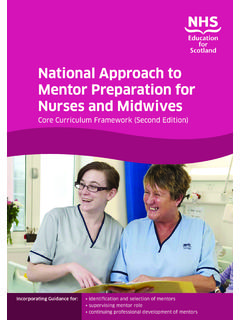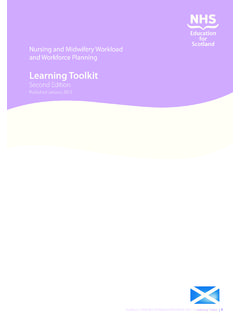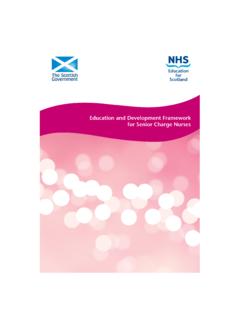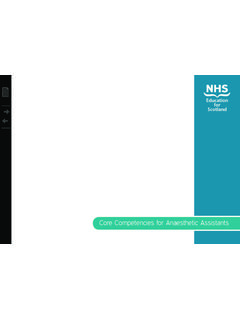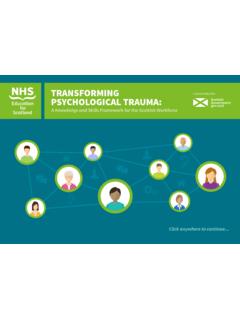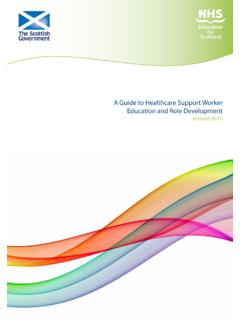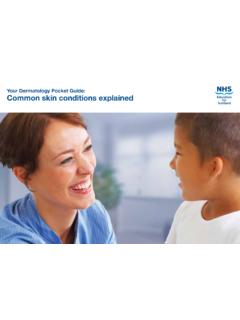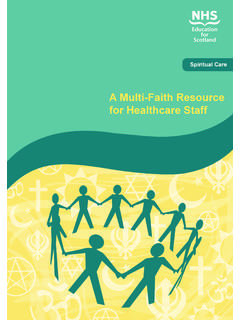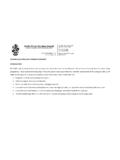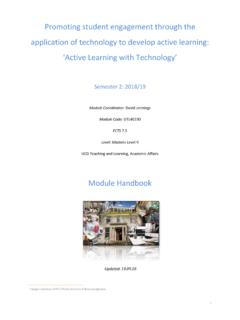Transcription of Train the Trainers’ Toolkit - NHS Education for …
1 Train the Trainers ToolkitHelping others to facilitate learning in the workplace:A Practical GuideClick anywhere to continue NHS Education for Scotland 2013. You can copy or reproduce the information in this document for use within NHSS cotland and for non-commercial educational purposes. Use of this document for commercial purposes is permitted only with the written permission of anywhere to continueIntroduction How to use the ToolkitTrain the Trainers ToolkitIntroduction to the ToolkitIntroduction How to use the ToolkitWho is this Toolkit for?This Toolkit is a training programme which can be delivered by experienced trainers / facilitators, with expert knowledge and skills in facilitating work-based learning. Ideally you should have qualifications and experience in healthcare Education , for example, those with a Post Graduate Certificate in Education or professionals who work in Continuing Practice and Professional Development departments or as a Practice Education Lead, GP Trainer or Learning and Development is this Toolkit for?
2 This Toolkit provides information and practical guidance on preparing healthcare professionals and service users or carers, who may be involved in facilitating inter-professional learning (IPL), uni-professional learning or service user/carer Education in the workplace. It will help them plan, deliver and evaluate their own learning programmes. Train the Trainers Toolkit | Introduction to the ToolkitIntroduction How to use the ToolkitTrain the Trainers Toolkit | Introduction to the ToolkitHow to use this ToolkitThe Toolkit is intended to be a flexible resource. You can use sections of the Toolkit to support existing learning programmes or activities which you currently deliver, or plan specific programmes depending on local or individual needs. The content is broken down into eight and adult learning2 Teaching and learning styles3 Teaching a practical skill4 Giving feedback5 Effective group work6 Writing aims and learning outcomes, and planning an inter-professional learning session7 Managing difficult behaviours in groups8 How to evaluateEach unit has an aim, learning outcomes, suggested pre-unit preparation, suggested session plans with activities and delivery times, powerpoint presentations, handouts and references with links to supporting material.
3 You can deliver the units as separate sessions or combine them into two one-day workshops or four half day workshops. Who should attend Toolkit training?The training is targeted at those involved in facilitating learning in the workplace, and require to develop their knowledge and skills within this area of practice. For example:n GP trainersn Dental trainersn Allied Health Professionalsn Nurses and Midwivesn Hospital Specialistsn Pharmacistsn Knowledge Services Staff n Clinical Psychologistsn Administrative and Clerical Mentorsn Healthcare Chaplainsn Support workersn Healthcare users and carersn Healthcare ScientistsIntroduction How to use the ToolkitTrain the Trainers Toolkit | Introduction to the ToolkitPlanning a programme of learningHow you plan and deliver the units in this Toolkit will depend on the context, the learners and the time available. The time given in each unit is the suggested time to be allocated to each unit and is intended to be flexible:n Timings for presentations should be short and focused but responsive to questions and interactive with the audiencen Timings of group work should match with the needs of the group whilst ensuring learning outcomes are met by the end of each Unit.
4 The units may be delivered as a two day programme (Appendix 1), four half day programme (Appendix 2), delivered as separate units, or combined in a way that meets the specific circumstances. If delivering all the units over two or four days it is important to build in an introduction to the programme (see session plan Appendix 3). If delivering any of the units as stand alone units it is still important to build in an introduction session to facilitate positive group dynamics. You may also find slides/handouts from other units would be useful to enhance a stand alone unit. For example if running Unit 6 (Writing aims and learning outcomes and planning an inter-professional learning session) you may wish to add in slides on adult learning from Unit 1 as this is a very important context for this unit and also use slides and handouts from unit 8 on how they can evaluate their learning success of any programme of learning depends on the extent to which it responds to the needs of the participants as well as the needs of the organisation.
5 The programme should be designed to ensure there are opportunities for group interaction to allow both participants and facilitators taking part in the training to learn from and about each on the numbers attending, you may wish to have a large group presentation using the slides and split into smaller groups for the discussions and activities, in which case you will require additional facilitators and resources. To optimise the learning experience groups should be no larger than sample flyer to help advertise the training is provided (Appendix 4) It is also good practice to gather learning profiles for those attending your courses (Appendix 5). These can help you plan content and teaching and learning approaches that best fit with those attending. In terms of the learner profile another resource which you may find useful is the Readiness for Inter-professional Learning Scale (RIPLS) purpose of this questionnaire is to examine the attitude of health and social care students and professionals towards inter-professional learning - How to use the ToolkitTrain the Trainers Toolkit | Introduction to the ToolkitWhere did this Toolkit come from?
6 In 2008, the NHS Education Scotland (NES) South East Multi-Professional Team (SE MPT) developed an innovative approach to supporting inter-professional learning within the workplace, through the development and facilitation of an Inter-professional Masterclass. The aim of the Masterclass was to bring together a range of healthcare professionals to explore teaching methodologies and strategies which support inter-professional learning within the Masterclass was delivered over two days with the second day being held six eight weeks after the first. There was pre-course preparation for both days which included: self-assessment of learning styles, background reading and reflective thinking of current practice. Each day incorporated small and large group presentations which set the scene, followed by experiential learning in facilitated, small inter-professional groups. This Toolkit brings together resources used in these Masterclasses. Benefits of using this ToolkitThe NES SE MPT evaluated the impact of the Master classes on facilitating inter-professional learning in practice (NES 2011).
7 Overall, pre- and post-course evaluations were evaluated from 52 staff and seven in-depth telephone interviews were conducted from the same cohort of participants. People attending the Master class said: I would recommend this course to others as it helped me to have a greater understanding of the roles of members of the multi disciplinary team and how we all need the skills of each other to give comprehensive care The inter-professional mix in the small groups allowed me to become more comfortable with the concept of inter-professional learning It gives the opportunity to enhance previous knowledge through reflection, discussion and sharing experiences from different professional perspectives I will be able to apply the principles of adult learning theory, and design more robust aims and learning outcomes Introduction How to use the ToolkitTrain the Trainers Toolkit | Introduction to the ToolkitKey messages from the evaluation were: n 90% (n = 43) of attendees rated the course as good or excellentn Attendees self-rated confidence in their abilities rosen A recurring theme was that attendees had adopted a person-centred approach to inter-professional teaching and learning.
8 N Participants had applied many aspects of their learning and had progressed from a purely theoretical understanding of inter-professional learning to applying and modifying them accordingly. For example: setting learning outcomes; teaching a new skill using the 4 stage approach: developing evaluation strategies for training delivered. Examples of the ways that participants intended to use the learning gained from attending the IPL Master classes included in one to one supervision with students, facilitation of workshops at national events and designing and delivering learning programmes for staff working in acute and community the positive impact this course had on facilitating learning in practice, the NES SE MPT decided to further develop this Toolkit to enable it to be accessed and utilised by all NHS Toolkit has also been endorsed by the Scottish Diabetes Education Advisory Group (SDEAG) who has stated that the application of learning gained from taking part in this training will meet their Education requirements in preparing healthcare staff to facilitating learning programmes for others.
9 The Toolkit has been endorsed by the Scottish Diabetes Education Advisory Group (DEAG) as meeting the requirements of a trained educator according to the NICE criteria for the delivery of structured patient Education . All staff, support workers or patients who regularly teach patients or professionals about diabetes are strongly encouraged to attend this programme of learning. What is inter-professional learning?The most commonly accepted definition of inter-professional learning is provided by the Centre for the Advancement of Inter-professional Education (CAIPE) (1997) as occasions when two or more professions learn with, from and about each other to improve collaboration and the quality of care The concept of IPL is not new with publications on the topic from the mid 1960s onwards (Barr 2009). Over the past ten years it has become an integral part of many pre- and post registration health and social care professional programmes throughout the United Kingdom.
10 The driver for this rapid growth in IPL activity is increasing reference to requirements that all health and social care graduates are competent regarding inter-professional collaboration and team working in a variety of settings, and in the delivery of safe effective and person- centred care. This is evident in Government policy (Better Health Better Care, Scottish Government (2007), Healthcare Quality Strategy, Scottish Government (2010)) educational directives (QAA 2004) and regulatory bodies for health and social care professionals (Health Professions Council 2008, Nursing and Midwifery Council 2008, General Medical Council 2009). Inter-professional learning is also supported globally. The World Health Organisation (WHO) (2010) propose the purpose of this is to develop collaborative practice through which health workers from different professional backgrounds work together with patients, families, carers and communities to deliver the highest quality of care.
